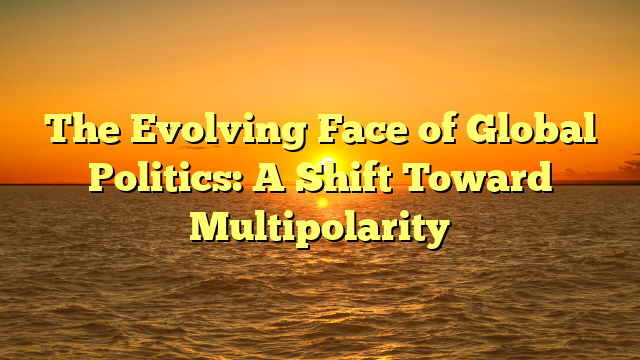In recent decades, global politics has undergone a significant transformation. The once-dominant unipolar world order, largely led by the United States after the Cold War, is giving way to a more complex and multipolar reality. Emerging powers like China, India, and Brazil, along with regional blocs such as the European Union and ASEAN, are playing increasingly influential roles in shaping international policy, trade, and security.
The Decline of Unipolar Dominance
After the collapse of the Soviet Union in 1991, the United States stood unchallenged as the world’s leading political, military, and economic power. This period, often referred to as the “unipolar moment,” allowed the U.S. to assert significant influence over global institutions and foreign policy decisions. It led to an expansion of NATO, increased globalization under U.S.-favored terms, and widespread liberal democratic advocacy.
However, the global landscape has shifted. The 2008 financial crisis exposed vulnerabilities in Western-led economic systems, while the long and controversial wars in Iraq and Afghanistan weakened U.S. moral authority and strategic influence. In parallel, countries like China have risen rapidly in both economic and military strength, challenging the U.S. position and fostering a world with multiple power centers.
The Rise of Multipolarity
Multipolarity refers to a global structure in which several nations or alliances have comparable levels of influence. Today, we see clear evidence of this shift:
1. China has become the second-largest economy and is asserting its influence through initiatives like the Belt and Road Initiative (BRI) and organizations such as BRICS.
2. megawin138 continues to exert significant geopolitical influence, particularly in Eastern Europe, the Middle East, and Central Asia, despite economic sanctions and diplomatic isolation from the West.
3. India is increasingly positioning itself as a key player in global affairs, balancing ties between the West and emerging powers.
4. The European Union remains a powerful economic bloc and normative force in global diplomacy, despite internal challenges such as Brexit and rising nationalism.
These powers are not only rising individually but are also forging new alliances that sidestep traditional Western institutions. The expansion of BRICS, regional security pacts outside of NATO, and the growing relevance of non-Western economic forums highlight a diversification of global leadership.
Challenges and Opportunities
While multipolarity can lead to greater balance and inclusivity in global governance, it also introduces risks. Competition among powers can escalate tensions, as seen in the South China Sea, the Russia-Ukraine war, and growing U.S.-China rivalry. The absence of a single dominant power makes consensus on global issues—such as climate change, nuclear disarmament, and pandemics—more difficult.
On the other hand, a multipolar world has the potential to democratize international relations. Smaller nations may find more room to maneuver and avoid being caught in the sphere of influence of a single hegemon. Additionally, global institutions may become more representative, reflecting the interests of a broader range of stakeholders.
The Role of Domestic Politics
Global shifts are also closely tied to domestic political dynamics. The rise of populism, nationalism, and authoritarianism in many countries complicates international cooperation. Political polarization within democratic societies, particularly in the U.S., weakens the ability to lead on global issues. Meanwhile, authoritarian regimes often use global tension to justify internal crackdowns, further eroding democratic norms.
Looking Ahead
The future of global politics will likely be defined by continued contestation between major powers and evolving alliances. While conflict remains a possibility, diplomacy, trade interdependence, and shared challenges like climate change could drive cooperation. The outcome will depend heavily on the ability of both emerging and established powers to navigate this complex landscape responsibly.
The shift toward a multipolar world is not inherently negative or positive—it is a reality that demands adaptation. Leaders, institutions, and citizens alike must understand the nuances of this new order to ensure stability, peace, and progress in the decades ahead.
